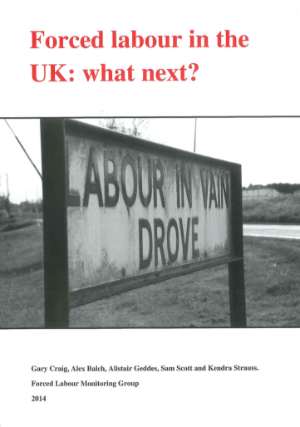Tackling Exploitation in Employment: Shaping the UK Response to Human Trafficking and Forced Labour
This research programme, led by Dr Alex Balch is a series of projects that focus on challenges faced by governments tackling the crime of human trafficking. Some projects are completed whilst others are still ongoing.
About
Projects have been funded by national and European bodies and include work on:
• analysing national and European regulatory frameworks
• political and organisational factors
• the role of the private sector in combating human trafficking.
Projects and findings
In 2009, in partnership with Dr Sam Scott from the Department of Geography and Planning, Alex undertook a full evaluation of the Gangmasters’ Licensing Authority (GLA) and its role in regulating businesses which provide workers to the fresh produce supply chain and horticulture industry. The research demonstrated that the GLA is achieving its aim to reduce worker exploitation in those sectors.
Alex also completed a report for the Joseph Rowntree Foundation (JRF) in 2012 on regulation and enforcement to tackle forced labour in the UK. This research formed part of a wider programme launched in 2013 by the JRF.
The research found inconsistencies in the legislative framework around human trafficking and forced labour, highlighting gaps in the UK's actions to combat forced labour. It also provided evidence of lower awareness among police officers about trafficking for forced labour when compared with trafficking for sexual exploitation. In 2012 Alex produced a report entitled 'Regulation and Enforcement to tackle Forced Labour in the UK: A Systematic Response'; this report was published by the JRF and circulated widely to the policy community around human trafficking and forced labour.

Outcomes
Findings and recommendations
Alex’s findings and recommendations have been taken up by both government and non-government organisations to improve the practice of regulation and enforcement around human trafficking/forced labour, as well as its analysis and evaluation.
The research has led to changed guidelines and practices and contributed to increased awareness and political change, eg.:
-
Findings on the poor awareness of the police about trafficking for forced labour have been acted upon by the UK Human Trafficking Centre (UKHTC) - the main body responsible for the training of UK police forces - thus improving education for UK police forces in this area
-
The government has responded to criticism regarding gaps in legislation. It is currently considering a new Bill on ‘modern slavery’ to recognise explicitly the problem of forced labour within the UK.
More projects
Forced Labour Monitoring Group
Alex is one of five academic members of the Forced Labour Monitoring Group (FLMG), a pilot project funded by the Economic and Social Research Council (ESRC) launched in 2013 with a programme of events to ensure the impact of research in this area.
Other FLMG members are:
- Dr Sam Scott (University of Exeter) who is the Project Leader
- Professor Gary Craig (University of Durham)
- Dr Alistair Geddes (University of Dundee)
- Dr Kendra Strauss (University of Cambridge).
EU project
Alex was the UK Team Leader on an EU project on corporate social responsibility and human trafficking. The project aims were to engage leaders in business sectors where human trafficking and forced labour are present to develop new modes of corporate social responsibility. The project was completed in April 2014. Publications and blog pieces are:
- Balch, A. and Rankin, G. (2014) Facilitating Corporate Social Responsibility in the Field of Human Trafficking: The Hotel Sector in the UK (report in press)
- With the University of Liverpool Heseltine Institute for Public Policy and Practice:
Working with the United Nations (UN)
The University of Liverpool is one of several institutions across six countries that are looking at ways of applying the UN Guiding Principles on Business and Human Rights as part of wider efforts to deal with human trafficking. This project is led by Conny Rijken (Tilburg University, Netherlands) and partners from organisations in Denmark, Austria, Spain, Italy and Belgium.